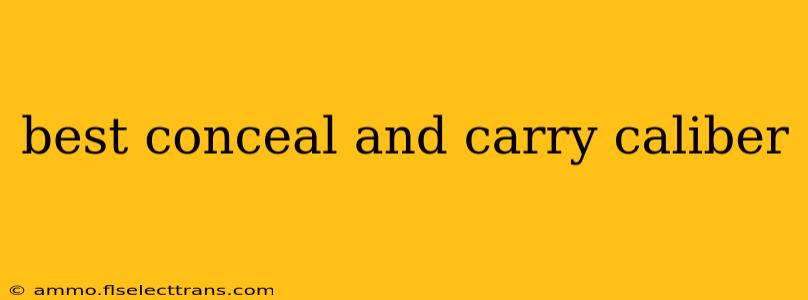Choosing the best concealed carry caliber is a deeply personal decision, heavily influenced by individual factors like hand size, shooting experience, and intended use. There's no single "best" caliber, but rather a range of excellent options, each with its own advantages and disadvantages. This guide will explore some popular choices, helping you make an informed decision based on your specific needs and priorities.
Factors to Consider When Choosing a Concealed Carry Caliber
Before diving into specific calibers, let's consider the key factors influencing your choice:
-
Shootability: How comfortable and accurate are you with the firearm and ammunition? A larger caliber might be less manageable for smaller hands or those with limited shooting experience. Practice is crucial, regardless of caliber.
-
Stopping Power: This refers to a round's ability to incapacitate a target. Larger calibers generally offer greater stopping power, but other factors like bullet design and placement are equally important.
-
Recoil: Higher caliber rounds typically generate more recoil, impacting accuracy and control, especially for less experienced shooters. Too much recoil can lead to flinching and missed shots.
-
Concealability: The size and weight of the firearm are crucial for comfortable concealed carry. Smaller calibers often allow for smaller, lighter firearms easier to conceal.
-
Ammunition Availability and Cost: Consider the availability and price of ammunition. Some calibers are more readily available and less expensive than others.
-
Personal Preference: Ultimately, the best caliber is the one you're most comfortable and proficient with.
Popular Concealed Carry Calibers: A Detailed Look
Several calibers consistently rank highly for concealed carry. Let's examine their pros and cons:
9mm
- Pros: High capacity magazines, relatively low recoil, widely available and affordable ammunition, good accuracy, suitable for a wide range of hand sizes.
- Cons: Less stopping power compared to larger calibers, though modern 9mm ammunition designs mitigate this considerably.
.45 ACP
- Pros: High stopping power, substantial bullet weight, reliable performance.
- Cons: Significant recoil, lower magazine capacity compared to 9mm, larger and heavier firearm generally required.
.40 S&W
- Pros: Good balance between stopping power and recoil, more manageable than .45 ACP.
- Cons: Can be snappy, higher recoil than 9mm, sometimes more expensive ammunition.
.380 ACP
- Pros: Very small and lightweight firearms are available, very easy to conceal, relatively low recoil.
- Cons: Limited stopping power, less effective at longer ranges.
10mm Auto
- Pros: High stopping power, flat trajectory.
- Cons: Significant recoil, can be challenging for some shooters, not ideal for extended periods of concealed carry due to the size and weight of typical 10mm handguns
Choosing the Right Caliber for You
The "best" concealed carry caliber depends entirely on your individual needs and circumstances. Consider your experience level, physical capabilities, and intended use. Spend time at a shooting range trying different calibers and firearms before making a decision. Consult with experienced shooters and firearms instructors for personalized advice. Remember, responsible gun ownership includes thorough training and understanding of firearm safety. The goal is to choose a caliber you are comfortable and proficient with, ensuring your safety and effectiveness in a self-defense situation.

